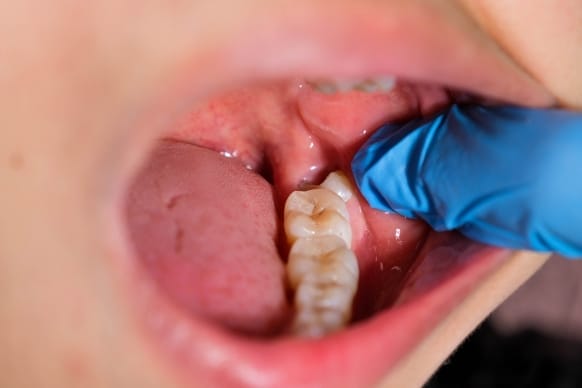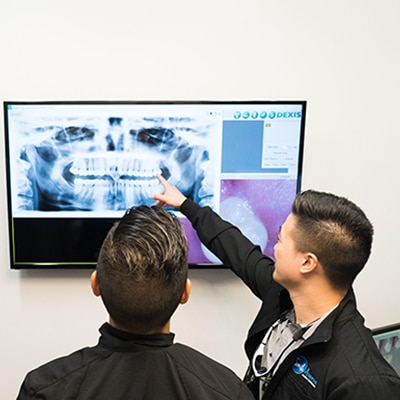
Key Takeaways:
- The average time for a wisdom tooth to fully emerge is between 17 and 25 years of age.
- Wisdom teeth can take several months or even years to fully come in once they start erupting.
- Pain and discomfort during the eruption process are common but can be managed with over-the-counter pain relievers and good oral hygiene.
- In some cases, wisdom teeth may become impacted or partially erupted, leading to infection or damage to neighboring teeth. In such cases, extraction may be necessary.
- Regular dental check-ups and X-rays can help monitor the progress of wisdom tooth eruption and identify any potential complications early on.
At what age do wisdom teeth typically start to emerge?
Wisdom teeth, also known as third molars, usually begin to emerge between the ages of 17 and 25. This is a time when most people have completed their dental development and these additional molars start to push through the gums. However, the exact timing can vary from person to person. Some individuals may experience the eruption of their wisdom teeth earlier or later than this typical age range.
Factors influencing eruption age
Several factors can influence the age at which wisdom teeth start to emerge. These include genetics, jaw size and shape, and individual oral health conditions. For example, if a person has a smaller jaw or crowded teeth, there may not be enough space for the wisdom teeth to come in properly. In such cases, they may become impacted or partially erupted.
Genetics:
The timing of wisdom tooth eruption can be influenced by genetic factors. If your parents experienced an early or late eruption of their own wisdom teeth, it is likely that you will follow a similar pattern.
Jaw size and shape:
The size and shape of an individual’s jaw can affect the eruption of wisdom teeth. If there is insufficient space in the jaw for these additional molars, they may become impacted or fail to fully erupt.
Oral health conditions:
Certain oral health conditions like gum disease or tooth decay can also impact the eruption of wisdom teeth. In some cases, these conditions may cause complications during the eruption process or lead to delayed emergence.
Overall, while the typical age range for wisdom tooth emergence is between 17 and 25 years old, it is important to remember that individual variations exist due to genetic factors, jaw size and shape, and overall oral health conditions.
How long does it usually take for a wisdom tooth to fully erupt once it begins to come in?
The time it takes for a wisdom tooth to fully erupt once it starts coming in can vary. On average, the eruption process can take several months. However, there is no fixed timeline as each individual’s experience may differ.
Stages of Wisdom Tooth Eruption
Wisdom tooth eruption typically occurs in stages. These stages include:
1. Initial movement: The wisdom tooth begins to shift and move within the jawbone.
2. Eruption through the gumline: The tooth breaks through the gums partially or fully.
3. Final positioning: The wisdom tooth settles into its final position alongside the other teeth.
Factors affecting eruption time
Several factors can influence the duration of wisdom tooth eruption:
Position and angle:
The position and angle at which the wisdom tooth is growing can impact how long it takes to fully erupt. If it is growing at an angle or facing obstacles, such as adjacent teeth or bone, it may take longer to emerge.
Obstacles:
If there are any obstructions, such as gum tissue covering the tooth or impaction against neighboring teeth, this can prolong the eruption process.
Jaw size and space:
The available space in the jaw plays a significant role in determining how long it takes for a wisdom tooth to erupt. If there is limited space, it may take longer for the tooth to find its proper position.
It is important to note that not all wisdom teeth fully erupt. Some may remain impacted or only partially break through the gums. Regular dental check-ups and X-rays can help monitor their progress and determine if any intervention is necessary.
Overall, while there is no fixed timeline for the full eruption of a wisdom tooth after it starts coming in, several factors including position, obstacles, and jaw size can influence the duration of the process.
Are there any factors that can influence the time it takes for a wisdom tooth to come in?
Factors Affecting Wisdom Tooth Eruption Time
There are several factors that can influence the time it takes for a wisdom tooth to come in. These include genetics, jaw size, and the position of the tooth. Genetics plays a significant role in determining when and how wisdom teeth erupt. If your parents experienced delayed eruption or impacted wisdom teeth, you may be more likely to have a similar experience. Jaw size also plays a role, as smaller jaws may not have enough space for the wisdom teeth to fully emerge. Additionally, if the wisdom tooth is positioned at an angle or is impacted, it may take longer for it to come in compared to a properly aligned tooth.
List of Factors:
- Genetics
- Jaw size
- Position of the tooth
Can the length of time for a wisdom tooth eruption vary from person to person?
Variation in Wisdom Tooth Eruption Time
Yes, the length of time for a wisdom tooth eruption can vary from person to person. While some individuals may experience a relatively quick and painless eruption process, others may face delays or complications that prolong the process. The variation can be influenced by factors such as age, overall oral health, and individual anatomy. Younger individuals tend to have faster eruption times compared to older adults whose bones are denser and less flexible. Additionally, individuals with good oral hygiene practices and healthy gums are more likely to experience smoother and quicker eruptions compared to those with underlying dental issues.
List of Factors:
- Age
- Overall oral health
- Anatomy
What are the common signs and symptoms indicating that a wisdom tooth is starting to emerge?
Signs and Symptoms of Emerging Wisdom Teeth
There are several common signs and symptoms that indicate a wisdom tooth is starting to emerge. These include pain or discomfort in the back of the mouth, swelling or tenderness in the gums, difficulty opening the mouth fully, and an unpleasant taste or odor near the affected area. Some individuals may also experience headaches or earaches due to the pressure exerted by the emerging tooth. It is important to note that not everyone will experience these symptoms, and some individuals may have fully erupted wisdom teeth without any noticeable discomfort.
List of Common Signs and Symptoms:
- Pain or discomfort in the back of the mouth
- Swelling or tenderness in the gums
- Difficulty opening the mouth fully
- Unpleasant taste or odor near the affected area
- Headaches or earaches
Is there any way to speed up or facilitate the process of a wisdom tooth coming in?
Orthodontic Treatment
One possible way to speed up the eruption of a wisdom tooth is through orthodontic treatment. In some cases, an orthodontist may use braces or other dental appliances to create space for the wisdom tooth to come in properly. By aligning the surrounding teeth and creating more room, this can help facilitate the eruption process.
Extraction of Obstructing Teeth
Another option is to extract any obstructing teeth that may be blocking the path of the wisdom tooth. This can be done by a dentist or oral surgeon, who will remove any teeth that are preventing the wisdom tooth from erupting. By eliminating these obstructions, it can allow the wisdom tooth to come in more easily and quickly.
Home Remedies
While there are no guaranteed home remedies to speed up the process of a wisdom tooth coming in, some individuals find relief by using over-the-counter pain relievers such as ibuprofen or applying a cold compress to reduce swelling. It’s important to consult with a dentist before trying any home remedies and to follow their recommendations for managing discomfort during this process.
Overall, it’s best to consult with a dental professional who can assess your specific situation and provide personalized recommendations on how to facilitate the eruption of your wisdom tooth.
Are there any complications or risks associated with delayed or prolonged eruption of wisdom teeth?
Delayed or prolonged eruption of wisdom teeth can potentially lead to several complications and risks if left untreated:
Infection
When a wisdom tooth remains partially erupted or impacted, it creates an opening where bacteria can enter and cause infection. This condition is known as pericoronitis and can result in pain, swelling, and difficulty in opening the mouth. In severe cases, it may require antibiotic treatment or even surgical intervention to alleviate the infection.
Crowding and Misalignment
If there is insufficient space for the wisdom tooth to fully erupt, it can cause crowding and misalignment of the surrounding teeth. This can lead to bite problems, difficulty in proper oral hygiene maintenance, and potential issues with overall dental health.
Cysts or Tumors
In rare cases, delayed eruption of wisdom teeth can result in the formation of cysts or tumors around the impacted tooth. These growths can cause damage to nearby teeth, nerves, and jawbone if left untreated. Regular dental check-ups and X-rays are essential for detecting such complications early on.
It is important to consult with a dentist or oral surgeon if you suspect any issues with your wisdom teeth to prevent potential complications from arising.
How long should I wait before seeking dental assistance if my wisdom tooth seems stuck or impacted?
If you suspect that your wisdom tooth is stuck or impacted, it is recommended to seek dental assistance as soon as possible. Delaying treatment can increase the risk of complications such as infection, damage to adjacent teeth, and discomfort.
However, every situation is unique, and the timing may vary depending on individual circumstances. It’s best to consult with a dentist who can evaluate your specific case and provide appropriate guidance. They will consider factors such as symptoms experienced, level of pain/discomfort, presence of swelling or infection, and overall oral health.
In some cases where there are no immediate complications or symptoms present, a dentist may recommend regular monitoring through periodic check-ups and X-rays to assess any changes in the position or condition of the impacted wisdom tooth.
Remember that early intervention can help prevent potential problems associated with impacted wisdom teeth. Therefore, it’s advisable not to delay seeking dental assistance if you suspect an issue with your wisdom tooth.
Can the duration of pain or discomfort during the eruption of a wisdom tooth vary among individuals?
Yes, the duration of pain or discomfort during the eruption of a wisdom tooth can vary among individuals. Factors such as the position and alignment of the tooth, the presence of any obstructions, and individual pain tolerance levels can influence the length and intensity of symptoms experienced.
For some individuals, the eruption process may be relatively smooth with minimal discomfort that lasts for only a few days. Others may experience more prolonged and intense pain that can last for several weeks.
It’s important to note that while some level of discomfort is common during wisdom tooth eruption, severe or persistent pain should be evaluated by a dental professional. They can assess if there are any complications such as infection or impaction that require intervention.
During this period, maintaining good oral hygiene practices, using over-the-counter pain relievers (as recommended by a dentist), and applying cold compresses can help alleviate discomfort. However, it’s always best to consult with a dental professional for personalized advice on managing pain or discomfort during wisdom tooth eruption.
Once a wisdom tooth has fully erupted, how long does it typically take for any associated pain or discomfort to subside?
Once a wisdom tooth has fully erupted, it is common for any associated pain or discomfort to gradually subside over time. The exact duration can vary depending on individual factors such as healing ability and overall oral health.
In general, mild soreness or sensitivity in the area may persist for several days to a couple of weeks after full eruption. This is considered normal as the surrounding tissues adapt to accommodate the new tooth.
To aid in alleviating any residual discomfort during this period, maintaining good oral hygiene practices such as gentle brushing and rinsing with warm saltwater can promote healing and reduce inflammation. Over-the-counter pain relievers may also be used as recommended by a dental professional.
If the pain or discomfort persists or worsens over time, it is advisable to consult with a dentist for further evaluation. They can assess if there are any underlying issues such as infection or misalignment that require attention. Regular dental check-ups are essential to monitor the health and stability of erupted wisdom teeth.
In conclusion, the time it takes for a wisdom tooth to fully emerge varies among individuals but generally ranges from a few months to a couple of years.
How long does it take a wisdom tooth to come in once it erupts?
The process of upper wisdom teeth fully erupting can take anywhere from a few weeks to several months.
How long does it take for wisdom teeth to come in once the pain starts?
Typically, these painful episodes will only last for about seven to ten days if there are no complications. Acetaminophen or ibuprofen can help manage the pain. It may take up to a year or even several years for wisdom teeth to fully emerge, and discomfort can be expected during this time.
Do wisdom teeth come in 1 at a time?
No, it is not always the case that all four wisdom teeth come in simultaneously, but they are always the final set of teeth to emerge. Typically, the lower teeth tend to appear before the upper teeth, and they come in pairs on both the right and left sides of the jaw.
How long do wisdom teeth take to pull?
The extraction of wisdom teeth involves the use of IV anesthesia by an oral surgeon who is certified. This will sedate the patient, but if they prefer to remain awake during the procedure, the surgeon can use a local anesthetic to numb the mouth. The entire tooth extraction process typically lasts for 30-45 minutes.
Do wisdom teeth erupt overnight?
Pain from wisdom teeth can sometimes appear without warning, suddenly emerging overnight. Alternatively, it can develop slowly over time and may be ignored or misinterpreted as another issue.
Do wisdom teeth erupt suddenly?
The emergence of wisdom teeth varies from person to person, and they may not all come in at the same time. It is possible for one tooth to become impacted while the others come in without issue. There may be cases where two teeth come through simultaneously, and then a year later the remaining two teeth emerge.
For comprehensive assistance in maintaining your dental health, we recommend visiting Smile Avenue, the nearest dental office in Cypress, TX. Dr. Vuong, your trusted Cypress dentist, is readily available to assist in case of any dental emergencies. Remember to schedule an appointment to address your dental needs promptly.











